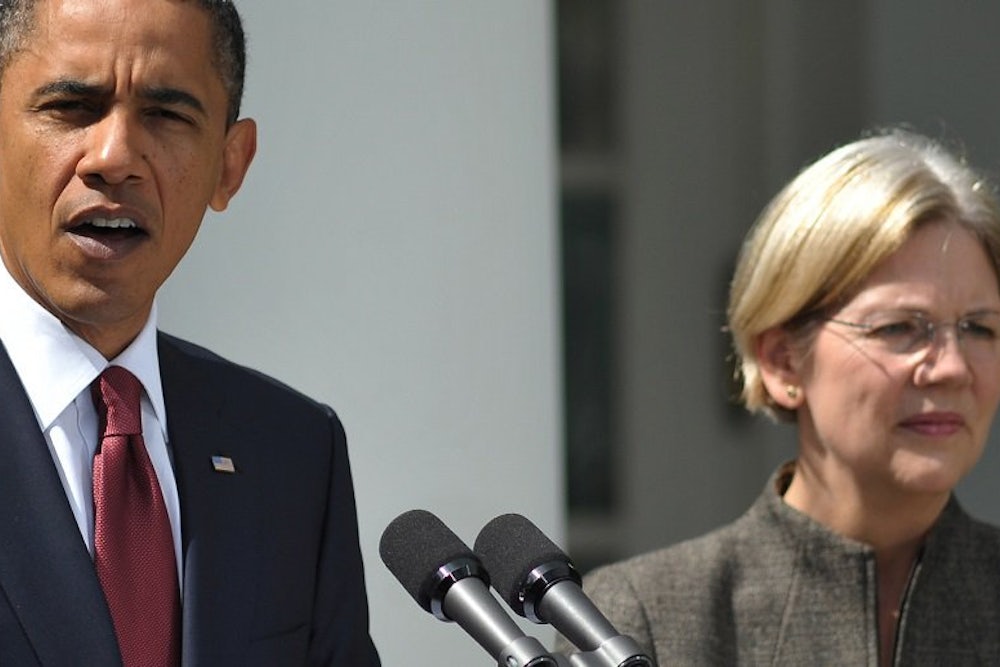Last Wednesday at the AFL-CIO’s National Summit on Raising Wages in Washington, D.C., Senator Elizabeth Warren stressed that the middle class was still struggling and sharply criticized elites in the capital for celebrating the economic recovery. “[T]he overall picture doesn't tell us much about what's happening at ground level to tens of millions of Americans,” she said. “Despite these cheery numbers, America's middle class is in deep trouble.” Warren’s comments were taken as a rebuke to President Barack Obama, who was on a three-city tour touting the improved economy.
There are certainly differences between the Democratic establishment and Warren Democrats. But it’s also easy to exaggerate those differences. Warren and Obama largely agree on the state of the economy and underlying economic agenda. In the end, they are both playing important political roles within the Democratic Party—and the party is better off for it.
When Obama and Warren talk about the economy, they differ mostly on the conditions they emphasize. Obama travelled to Detroit to talk about the resurgent auto industry, promoted the five percent annualized growth rate in the third quarter and celebrated 58 straight months of private sector job creation. These facts are all true. The economy really has rebounded. Nearly three million people gained jobs in 2014. Plummeting oil prices are acting as an effective tax cut across the country. To diminish these things, as Warren does in her speeches, is to understate the legitimate success of Obamanomics, something that even conservatives are struggling to deny.
And yet, Warren is also right that millions of Americans haven’t shared in the economic recovery. The most important statistic: Real median income in 2014 is still below its 2007 levels. The December jobs report, which the Labor Department released last Friday, showed that wages actually fell 0.2 percent in December and November’s 0.4 percent wage growth was revised down to 0.2 percent. As much as the recovery has improved, the majority of Americans really aren’t experiencing those improvements.
This is the political conundrum facing the Democratic Party, particularly after they were trounced in the midterm elections last November. How do they take credit for the economy’s successes while empathizing with working class voters who haven’t seen those successes? One possibility is to have different party leaders express different sentiments. That’s effectively what Obama and Warren have done over the past few months. Whether that is an effective political strategy for the party is yet to be seen.
As for the actual policy differences between Obama and Warren, there's far more that unites them than divides them. Their largest fights are over financial regulation and trade. Warren has repeatedly called for breaking up the big banks, something Obama has not done. Yet, the president supports Dodd-Frank and will not allow Republicans to tear it apart. Last Friday, Treasury Secretary Jack Lew penned an op-ed for the Washington Post repeating the administration’s support of the financial regulatory law.
But beyond those, their differences on financial regulation are often strategic. Warren, for instance, nearly killed the government funding bill that passed in December—the so-called CROmnibus—over a provision that allowed banks to use government backed funds to trade in certain risky financial products. Obama supports that regulation; he just didn’t want to risk a government shutdown over it.
In her speech on Wednesday, Warren also criticized former President Bill Clinton and the deregulatory actions he took during his presidency. "Pretty much the whole Republican Party—and, if we're going to be honest, too many Democrats—talked about the evils of 'big government' and called for deregulation," she said. It's hard not to read that as a thinly veiled shot at Hillary. But the Democratic Party of the 1990s is different from the one that exists today. There is much wider agreement that Wall Street must be strictly regulated. There is still disagreement on the level of regulation—whether or not to break up the banks especially—but the pendulum has certainly moved closer in Warren's direction over the past 20 years.
Beyond financial regulation, while Obama and Warren’s rhetoric differs significantly, their economic agendas share many features. They both support raising the federal minimum wage to $10.10 an hour and increased infrastructure spending. They both want higher taxes on the rich and more funding for things like universal pre-kindergarten. They both support the Federal Reserve's efforts to strengthen the economy (although neither speaks about the Fed nearly enough).
I don’t want to understate the differences between the Democratic establishment and Warren Democrats. They’re real. Warren still believes Wall Street and corporate lobbyists have far too much influence within the executive branch and at the DNC headquarters—and worries that that influence will only increase if Hillary wins the presidency. Yet, the underlying policy differences between the two sides just aren't that great. After all, the biggest upcoming fights in the Democratic Party are over the nomination for the number-three position at Treasury and how high the administration should set the overtime threshold. That's hardly a Democratic civil war.
